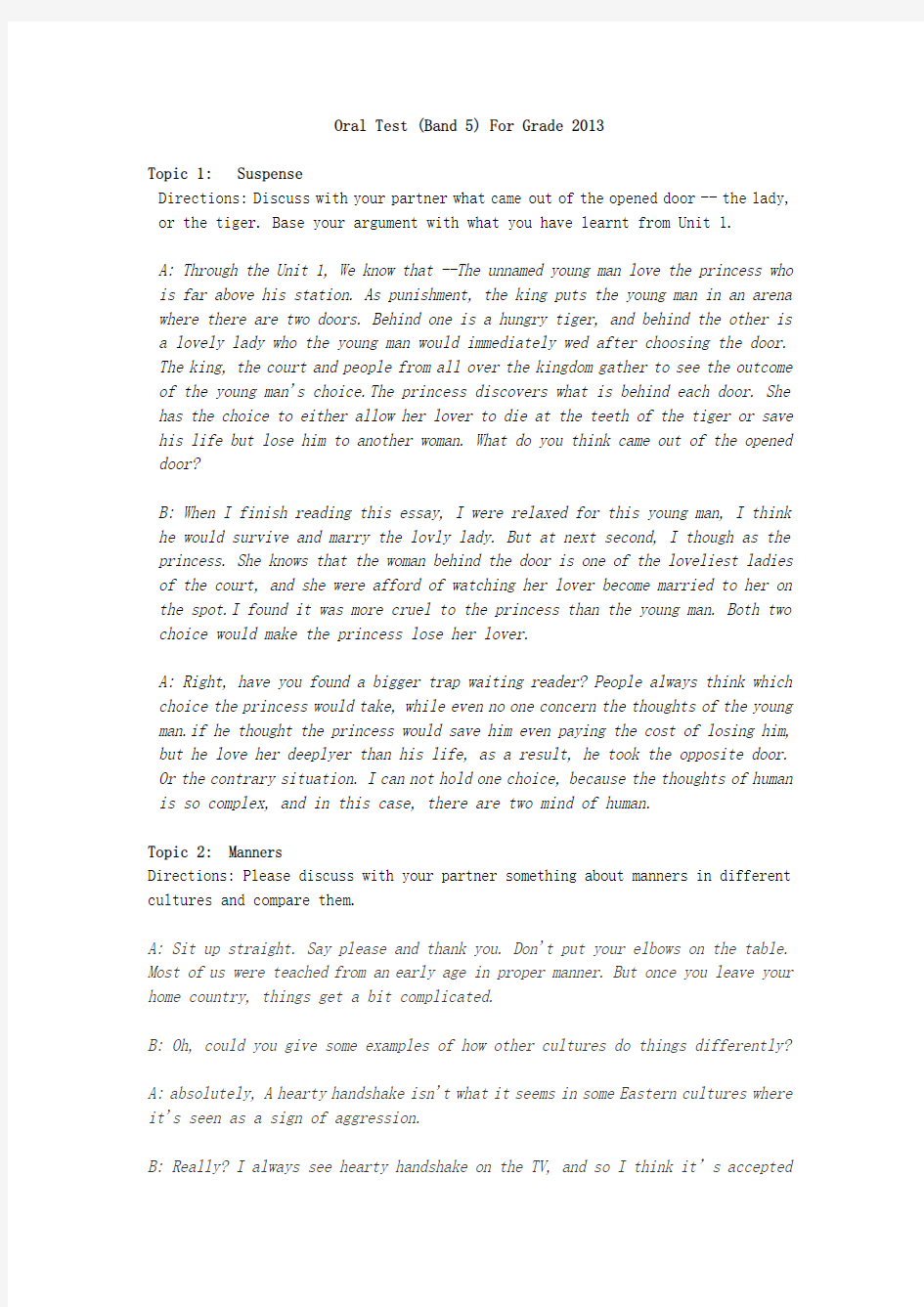
2013级武汉大学 大学英语5期末 口语试题
- 格式:pdf
- 大小:136.74 KB
- 文档页数:7


Oral Test (Band 5) For Grade 2013
Topic 1: Suspense
Directions: Discuss with your partner what came out of the opened door -- the lady, or the tiger. Base your argument with what you have learnt from Unit 1.
A: Through the Unit 1, We know that --The unnamed young man love the princess who is far above his station. As punishment, the king puts the young man in an arena where there are two doors. Behind one is a hungry tiger, and behind the other is a lovely lady who the young man would immediately wed after choosing the door. The king, the court and people from all over the kingdom gather to see the outcome of the young man's choice.The princess discovers what is behind each door. She has the choice to either allow her lover to die at the teeth of the tiger or save his life but lose him to another woman. What do you think came out of the opened door?
B: When I finish reading this essay, I were relaxed for this young man, I think he would survive and marry the lovly lady. But at next second, I though as the princess. She knows that the woman behind the door is one of the loveliest ladies of the court, and she were afford of watching her lover become married to her on the spot.I found it was more cruel to the princess than the young man. Both two choice would make the princess lose her lover.
A: Right, have you found a bigger trap waiting reader? People always think which choice the princess would take, while even no one concern the thoughts of the young man.if he thought the princess would save him even paying the cost of losing him, but he love her deeplyer than his life, as a result, he took the opposite door. Or the contrary situation. I can not hold one choice, because the thoughts of human is so complex, and in this case, there are two mind of human.
Topic 2: Manners
Directions: Please discuss with your partner something about manners in different cultures and compare them.
A: Sit up straight. Say please and thank you. Don't put your elbows on the table. Most of us were teached from an early age in proper manner. But once you leave your home country, things get a bit complicated.
B: Oh, could you give some examples of how other cultures do things differently?
A: absolutely, A hearty handshake isn't what it seems in some Eastern cultures where it's seen as a sign of aggression.
B: Really? I always see hearty handshake on the TV, and so I think it’s accepted
by all over the world. I also know a example.In most of the Middle and Far East, it is considered an insult to point your feet at another person or to display them in any way, for example, by resting with your feet up.
A:Yes, I heared that before. And in most Asian countries, a business card is seen as an extension of the person; therefore, to disrespect a card -- by folding it, writing on it, or just shoving it into your pocket without looking at it -- is to disrespect the person who gave it to you.
B:Oh, it is really important to learn about them before go abroad.
A:yes.
4. Crushing Handshake
Nowadays, a bone-crushing handshake is seen as admirable in the United
States and U.K., but in much of the East, particularly the Philippines, it is seen as a sign of aggression -- just as if you gave any other part of a person's body a hard squeeze!
5. To Shake or Not to Shake
Orthodox Jews will not shake hands with someone of the opposite sex, while a strict Muslim woman will not shake hands with a man. To confuse matters, a Muslim man will shake hands with a non-Muslim woman. People in these cultures generally avoid touching people of the opposite sex who are not family members.
6.Clearing Your Plate
When dining in China, never force yourself to clear your plate out of politeness -- it would be very bad manners for your host not to keep refilling it. Instead, you should leave some food on your plate at each course as an acknowledgment of your host's generosity.
Manners that may be good in the United States may not be in other parts of the world. See the rest of our list to learn more.
7. No Tipping!
In Japan and Korea, a tip is considered an insult, rather than a compliment, and for them, accepting tips is akin to begging. However, this tradition is beginning to change as more Westerners bring their customs with them to these countries. The "okay" sign (thumb and forefinger touching to make a circle) is very far from okay in much of the world. In Germany and most of South America, it is an insult, similar to giving someone the finger in the United States, while in Turkey it is a derogatory gesture used to imply that someone is homosexual.
Similarly, in the U.K., when the two-fingered "V for victory" or "peace" salute is given with the hand turned so that the palm faces inward, it is considered extremely rude, having a meaning similar to raising the middle finger to someone in the United States.